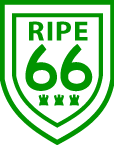Meeting Report
Monday, 13 May
RIPE 66 Tutorials
RIPE 66 kicked off on Monday morning with parallel tutorials: “Wireless LAN 101” with Osama I. Al-Dosary in the Herbert Room and “Improve your Presentations” by Sandra Brás, RIPE NCC. The tutorials were well attended.
Newcomers’ Introduction Talk
First-time attendees were welcomed by RIPE Chair, Rob Blokzijl and RIPE NCC Managing Director, Axel Pawlik, at the Newcomers’ Introduction Talk. Newcomers’ learned about RIPE, the RIPE NCC and the ins and outs of a RIPE Meeting.
RIPE 66 Opening Plenary
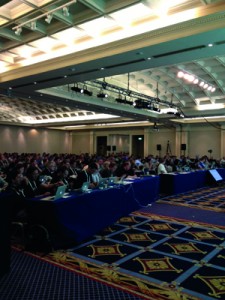
RIPE Chair, Rob Blokzijl, and John Boland, HEAnet CEO, welcomed a packed room of RIPE 66 attendees during the first Plenary session of the meeting. RIPE NCC Chief Communications Officer, Serge Radovcic, introduced the RIPE NCC Survey 2013 and encouraged attendees to take part. Filiz Yilmaz, RIPE Programme Committee (PC) Chair gave an overview of the PC’s responsibilities for the Plenary programme and welcomed feedback. Attendees who logged in to RIPE NCC Access can rate the Plenary presentations and beentered into a draw to win one of two EUR 100 Amazon gift vouchers. The session continued with Olaf Kolkman, NLnet Labs and his presentation, “Innovation at the Waist” – a philosophical/psychological look at DNSSEC and IPv6 deployment. The session finished with “Seeing The Past, Present and Future: Macro Trends in Networking and the Role of Software Defined Networking” by David Meyer, Brocade/Univ. of Oregon.
RIPE 66 Plenary – Monday, 16:00
There were two presentations and three lightning talks in the second Plenary session on Monday. Michele McCann, Teraco, gave an eye-opening look at the Internet ecosystem in Africa with her presentation “Building the Case for Africa: Using Open Peering to Reduce Risk and Expose the Myriad Opportunities Available in the African Market to New Entrants”.
The Internet Society’s Jan Žorž gave a call to arms with his presentation on best current practices and the Internet Society’s efforts in this regard.
Patrik Fältström, Netnod, kicked off the lightning talks with his presentation “Path to SSAC-057 and the Aftermath”. Randy Bush from the Internet Initiative Japan followed with a lively presentation on the suitability of ping to measure latency, which drew several responses.
The final talk of the day came from Marcos Pereira Dias, University of Melbourne. Marcos spoke on Australia’s Project for Universal Broadband Access: From Policy to Social Potential. He was the first speaker from the RIPE Academic Cooperation Initiative (RACI), which aims to increase links between RIPE and the academic community by giving students the opportunity to participate at RIPE Meetings.
Monday’s Birds of Feather (BoF) Sessions
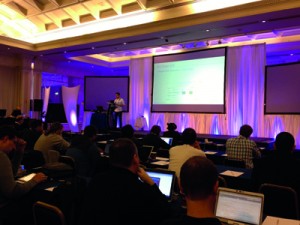
Two BoFs were held on Monday evening. Jan Žorž presented “Operations Meets Standardisation (and vice-versa)”, a continuation of his “Best Current Operational Practices” presentation during the Plenary session earlier that day. The aim was to gather interested people in starting a community effort and a discussion group focused on creating documents that describe how the Internet is run today (IPv6 and IPv4) and how we implement new technologies like IPv6, DNSsec, RPKI and others. At the second BoF, the RIPEstat Team gave a live demo covering the latest features and new functionality in RIPEstat, the RIPE NCC’s “one-stop shop” for Internet address space information, since the last live demo at RIPE 65. Highlights included the return of the popular BGPlay routing visualisation tool. Attendees were able to ask questions and provide feedback directly to the developers of RIPEstat.
Unwinding at the RIPE 66 Welcome Event
Attendees met at the meeting venue’s Bellini Bar at the end of a busy day for the first social event of the meeting week. The Guinness and conversation flowed as old friends caught up and new friends were made.
Tuesday, 14 May
Tuesday Morning Plenary, 9:00
Dave Wilson, HEAnet, talked about their work in developing virtual customer premises equipment (CPE) in his presentation, “Virtualising Our CPE”. This approach allows them to eliminate routers at the customer end, use less hardware and have a simpler network design. It also gives them agility to enable new customers quickly. Next, Wolfgang Tremmel, DE-CIX, talked about their plans to replace their current switching platform with new hardware from multiple vendors in his presentation, “DE-CIX Apollon – Our New Platform. How We Designed, Selected and Will Build It”. The new platform will be more efficient and support 10G and 100G ports at high densities. They will begin the upgrade process next week, and migrate users to it over the next few months. Finally, Alan Mauldin, TeleGeography, talked about the growth of undersea cables all over the world with his presentation, “International Submarine Cable Trends”. There has been a lot of growth in Asia and Africa in the last few years, with capacities matching those of trans-Atlantic cables. Dan York, ISOC, asked about potential vulnerabilities and Alan mentioned Egypt and Singapore being areas of concern because many cables pass through or past them.
Tuesday Morning Plenary, 11:00
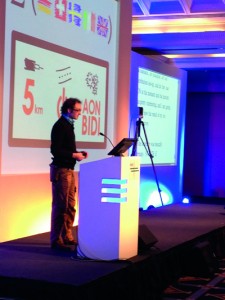 The second Plenary session of the day began with an interesting presentation by flexOptix’ Thomas Weible called “FTTx – Find The Technology x”. It was followed by ARIN’s Chris Grundemann with an in-depth look into the next generation of home networks: “The Future of Home Networking: The HIPnet Solution”. Chris emphasised that the key benefits of this solution included directionless home routers, recursive prefix delegation and hierarchical routing. His presentation was followed by several comments and questions from the audience.
The second Plenary session of the day began with an interesting presentation by flexOptix’ Thomas Weible called “FTTx – Find The Technology x”. It was followed by ARIN’s Chris Grundemann with an in-depth look into the next generation of home networks: “The Future of Home Networking: The HIPnet Solution”. Chris emphasised that the key benefits of this solution included directionless home routers, recursive prefix delegation and hierarchical routing. His presentation was followed by several comments and questions from the audience.
The session’s final presentation before lunch was a detailed examination of “IPv6 at CiscoLive 2013: Behind the Scenes”, presented by Andrew Yourtchenko and Daryl Tanner from Cisco. There were a few queries from attendees in the room and via the chat room asking when Cisco would deploy IPv6 everywhere but the presenters couldn’t give a definitive answer.
Tuesday Afternoon Plenary, 14:00
The afternoon Plenary sessions kicked off with three interesting lightning talks. Actually, the first was a “silent talk”, as Niall O’Reilly from University College Dublin depicted the need for RIPE community members to participate in the decision-making process in “Thoughts on Community and Decision-making” using only a set of slides. Erik Bais from A2B Internet B.V. made a pitch to get more DShield VPS sensors to give quicker insight into new scans globally in his presentation “ISC SANS – DShield Request”, while Tomáš Hlavácek from CZ.NIC described the development of a “Universal Looking Glass”. Job Snijders of Atrato Communications gave an entertaining talk (which included his shoe size) in “What’s Up With Poor Performance Towards MAC Addresses Starting With 4 or 6?”, which explained the strange behaviour seen in these cases along with some potential solutions. Lastly, Manish Karir of DHS S&T Cyber Security Division presented the results of the “IPv6 Darknet Traffic Analysis”, which described how extensive Internet pollution was seen in space that should be “dark”.
Tuesday Afternoon Plenary – 16:00
Paul Ebersman, Infoblox, talked about various types of DNS attacks, and how operators could defend their servers and users from some of these attacks in his presentation, “DNS: Attack or Defense”. Next, Merike Kaeo, Internet Identity, talked briefly about DNS reflection and amplification attacks with her presentation, “DNS Amplification Attacks – Are YOU Part of the Problem?”. She said the problem is only getting worse, especially with the large numbers of open resolvers on the Internet. She mentioned a number of mitigation techniques, and stressed that good network hygiene is important.
The session ended with a panel: “Seven Years of Anti-Spoofing: What Happened Since the RIPE Task Force and What Still Needs to be Done”, moderated by Benno Overeinder, NLnet Labs, and Andrei Robachevsky, Internet Society. Benno Overeinder did an introduction showing that DDoS attacks are getting bigger and more frequent. The panel was presented with some questions from the moderators as well as the audience. There was a lot of interesting discussion. The general conclusion was that network hygiene is important, the community should do more to get BCP38 and BCP84 deployed because if they don’t act soon, regulators may do this for them. Another important discussion was that vendors should ship better defaults and that we should fix unmanaged open resolvers.
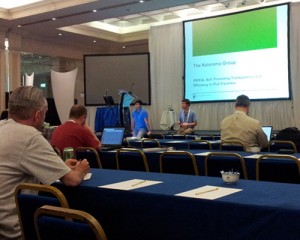
Tuesday’s Birds of a Feather (BoF) Session
Representatives from IPv4 broker Kalorama Group gave an introduction to the current dynamics of IPv4 transfer markets in different regions, including market trends, transfer policies, and other related issues.
Participants discussed future policy proposals and forecasts that may affect market dynamics over cold cans of Heineken and Harp.
INEX Party at 37 Dawson Street
There was a great INEX-sponsored party last night at Dublin’s hip 37 Dawson Street. Attendees were able to sample some of Dublin’s local craft beers, tasty cocktails and great music. Thanks INEX!
Wednesday, 15 May
Address Policy Working Group
Emilio Madaio, RIPE NCC, updated attendees on policies from the RIR communities. Andrea Cima, RIPE NCC, presented a report on the RIPE NCC’s recent work in Registration Services and received helpful input from attendees on several issues. Gert Doering, Address Policy Working Group Chair, updated attendees on current policy proposals. Tore Anderson, Redpill Linpro, then presented “2013-03 No Need – Post-Depletion Reality Adjustment and Cleanup” and explained the benefits of his proposal. APNIC and ARIN staff shared their experience with inter-RIR transfers.
Database Working Group
The session began with an update from the RIPE NCC’s RIPE Database Manager, Kaveh Ranjbar. The main developments include: a complete redevelopment of the whois backend that was finished in Q1 2013; the RIPE Database code is now fully available as open source; object history is available for non-personal objects; and an upcoming integration of RIPE NCC Access to maintain objects.
RIPE NCC Services Working Group – Sessions I and II
Several interesting issues were discussed in the session. One was looking at the way RIPE Policy documents are stored and labelled on www.ripe.net. It was suggested that a small group propose how the RIPE NCC could improve the process. The discussion then moved to “Publication of Sponsoring LIR for Independent Number Resources”, presented by Nick Hilliard from INEX. One of the big questions was whether it was enough that the RIPE NCC holds this information or if it should be publicly available through the RIPE Registry.
Randy Bush, Internet Initiative Japan, and Axel Pawlik, RIPE NCC Managing Director, mounted the stage while holding hands to demonstrate a new relationship that, if not physical, was at least professional. They gave a shared introduction on “RIPE NCC Services to Legacy Resource Holders, Resource Certification for non-RIPE NCC Members and the Provision of RPKI for PI Address Space”.
Niall O’Reilly, University College Dublin, presented “RIPE NCC Services to Legacy Internet Holders”. Randy Bush then presented “RIPE NCC Services to PI Holders”. This was followed by a presentation by Erik Bais, A2B Internet BV, on “Resource Certification (RPKI) for Non-RIPE NCC members”. There was some debate, with Sasha Luck maintaining his opposition to RPKI. Randy Bush replied that the decision to use RPKI was up to the individual but that policies should not be made that restrict his ability to use tools in his toolbox.
The second session began with a “Report from the RIPE NCC” by Axel Pawlik. Serge Radovcic, RIPE NCC’s Chief Communications Officer, discussed the RIPE NCC Survey 2013 and urged attendees to take part. Paul Rendek, RIPE NCC’s Director of External Relations, updated attendees on Internet governance and he was followed by a Registration Services update by Andrew de la Haye, RIPE NCC’s Chief Operations Officer. Mirjam Kühne, RIPE Labs Community Builder, shared the new RIPE NCC Roadmap prototype and encouraged everyone to give input via RIPE Labs.
DNS Working Group – Session I and II
Stephan Rütten, SIDN, gave a presentation on the impact of recent attacks and the measures they took was well received. People responded very positive to Peter Janssen, EUrid, and his presentation, “Dynamic Zone Provisioning in YADIFA”, which included a live demo of this new way of using DNS packets to provision DNS services.
In the second DNS session, Anand Buddhdev from the RIPE NCC gave an update on the status of DNS services and gave a preview of the new DNSMON functionality that will be offered based on the RIPE Atlas infrastructure. This was followed by Niall O’Reilly’s short ENUM update. Next, Patrik Fältström, Netnod, gave a repeat of his “Fun with TLDs” lightning talk which he presented in the Plenary session earlier in the week. Lastly, a very detailed presentation was delivered by Matt Larson from VeriSign, outlining an analysis of query traffic to .com/.net name servers.
IPv6 Working Group – Session I
The first session of the IPv6 Working Group had a list of very interesting presentations that attracted some good discussion between the presenters and the audience. The presentation by David Taht, “Fixing Bufferbloat with OpenWRT”, was especially well received. He discussed a project in which he and his colleagues built a home router that solves a number of open issues still present in many other home CPEs. His comment, however, that he wouldn’t like to expose this product to “your women and children” (because it is still a research project), was answered by Vesna Manojlovic, RIPE NCC, who said even though she liked the project, she would like to help him expose it to more women and children, which was welcomed by a long applause and a lot of laughter.
Thursday, 16 May
IPv6 Working Group – Session II
The second IPv6 Working Group (WG) session focussed on IPv6 measurements. Vaibhav Bajpai, one of the RIPE Academic Cooperation Initiative (RACI) participants, shared his PhD work: “Measuring the Effectiveness of Happy Eyeballs”. Vesna Manojlovic, RIPE NCC, presented the first results of the fifth star for IPv6 RIPEness which were recently published on RIPE Labs. This initiative was welcomed and supported by the WG participants.
The session ended with five panellists from various organisations and backgrounds discussing whether the IPv6 measurements done today are sufficient and if other measurements and initiatives should be done in order to follow progress and to further promote IPv6 deployment.
EIX WG – Sessions I and II
Eileen Gallagher, INEX , began the session with “IXP Peering Landscape in Ireland” followed by Bartek Raszczyk, LINX, with “The LINX Juniper 100G Network Deployment & Extreme VPLS Introduction”, then Thomas O’Sullivan, AMS-IX, with “AMS-IX’s GRX and IPX” and Greg Hankins, Brocade, “400 GbE, a Lightning Talk”. The final presentation of the day was “The Open-IX Project” by Dave Temkin, Netflix Luxembourg, and Martin Hannigan, Akamai Technologies. EIX continued after the lunchbreak with a series of updates from Internet exchanges.
Cooperation Working Group
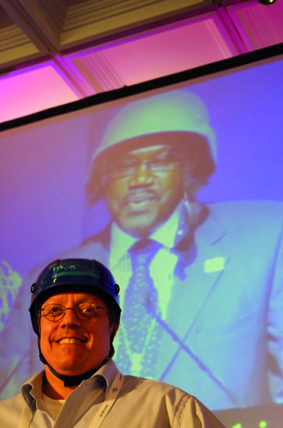
(c) 2013 Olaf Kolkman (Licensed under a Creative Commons
Attribution 3.0 Unported)
The Cooperation Working Group session kicked off with Co-Chair Patrik Fältström donning a blue helmet, following the example of the ITU Secretary General’s example in Geneva this week. The packed agenda started with a report from the RIPE NCC on subjects including the ongoing ITU World Telecommunications/ICT Forum and the RIRs’ engagement there.
Andrea Servida of the European Commission sparked intense discussion with his presentation on proposed EU regulation regarding electronic identification and trust services, while Michele Neylon (Blacknight Solutions) led a discussion of the state of public/private cooperation in the Irish Internet sector.
Anti-Abuse Working Group
There was a short discussion on the charter of the Working Group, which will be continued on the list. Denis Walker, RIPE NCC, gave an update on the implementation of abuse-c: in the RIPE Database. Brian Nisbet, AAWG Co-Chair gave an update on the interaction with other RIPE Working Groups, especially the Database Working Group. Marco Hogewoning, RIPE NCC, gave a short presentation, “Outreach to Law Enforcement”. This was followed by a presentation delivered by Richard Leaning on the European Cybercrime Centre (EC3). There were a lot of comments and questions for Richard and the participants were very pleased to see someone from a law enforcement agency present in the AAWG (without a suit on). The session was concluded by a presentation from Michele Neylon, Blacknight, about the risks of buying cheap pharmaceuticals online.
Routing Working Group
The session started off with a presentation from APNIC’s George Michaelson, outlining some of the Route Object creation issues that users and RIR staff are facing today. In addition, he asked the room for feedback on how to converge the RPKI data set and the IRR data, in order to make user management easier. There was a lively debate on how to move forward with these topics. This was followed by at presentation from Christian Martin, Cisco, on segment routing, after which Gunther van de Velde, Cisco, offered his views on the BGP Remote Next-Hop Attribute as well as a DDoS Mitigation methodology he has running in his lab. Before closing the session, Daniel Karrenberg, RIPE NCC, asked the room for feedback on how to move forward with alternatives with the IPv6 Darknet Routing experiment.
Measurements Analysis and Tools (MAT) Working Group
The MAT Working Group unveiled a number of measurement tools and projects that received a lot of positive feedback. Christian Kaufmann, RIPE NCC Executive Board, asked about the usefulness of his master’s thesis on differences in network latency between IPv4 and IPv6, using the RIPE Atlas network to collect data (luckily for him, the crowd gave a thumbs up!). Trevor Burbridge, BT, discussed an initiative to develop a large-scale broadband measurement system and presented on various activities within the IETF, Broadband Forum and EU Leone project. Vesna Manojlovic, RIPE NCC, gave an update on the latest features and functionality in RIPEstat and RIPE Atlas, and Massimo Candela from Roma Tre University earned a round of applause after showcasing the newly revamped and much loved BGPlay tool, now available via RIPEstat.
OpenSource BoF
This BoF was a successful dry run for a potential future RIPE Working Group, with a panel discussion aimed at developers, ISPs and other RIPE community members about open source projects related to the RIPE community. The future of this BoF as a Working Group will be discussed on the mailing list.
RIPE Atlas Community BoF
RIPE Atlas probe hosts, sponsors and ambassadors met to discuss the future development of the RIPE NCC’s global Internet active measurements network – and to get their cool RIPE Atlas t-shirts!
RIPE 66 Dinner at the Guinness Storehouse
The sold-out social event was a big success. Guests enjoyed a tasty buffet dinner, drinks and a night of entertainment. Oh, and did we mention the Guinness? Many thanks to the sponsor, GCCIX!
Friday, 17 May
Plenary
NRO/RIR Reports
A surprising number of people turned out, albeit a little sleepily, for the opening session of the final day of the meeting. Representatives from each RIR (excluding the RIPE NCC) gave updates on recent activities
and new initiatives within their regions, including Madhvi Gokool from AFRINIC, Paul Wilson from APNIC, Leslie Nobile from ARIN and Luisa Villa from Lacnic.
As NRO Chairman, Paul Wilson also gave an update on behalf of the NRO Executive Council. Ingrid Wijte of the RIPE NCC presented the latest NRO statistics, and Elise Gerich from IANA updated the audience on her organisation’s latest stats and figures. There were several questions around Resource Certification (RPKI) and inter-RIR transfers from the audience, and it was announced that German Valdez, Lacnic, has been
appointed the NRO Executive Secretary. Candidates for the RIPE Programme Committee also made statements ahead of the voting, which concluded shortly after the session.
Friday, 17 May 11:00 – 12:30
Closing Plenary
The Closing Plenary session wrapped up what was widely agreed to be an extremely successful RIPE Meeting — and the biggest yet, with 524 attendees including 155 newcomers!
The RIPE Programme Committee announced that Mike Hughes is the winner of the RIPE PC elections. Olaf Kolkman presented on WCIT and international telecommunication regulations. Two lightning talks were given, including by Jaap Akkerhuis, Routing Working Group Co-Chair, who warned about the potentially dangerous effect of space weather on earthbound networks, and Vesna Manojlovic, RIPE NCC, who proposed an easier way to manage unruly mailing lists. Angel Blazquez, RIPE NCC, reviewed the RIPE 66 Technical Report for the meeting and promised to look into an IPv6-only network next time.
Rob Blokzijl, RIPE Chair, closed the meeting and mentioned a few highlights from the Working Groups, including a proposal to start a new Open Source Working Group. After asking for audience feedback, Rob received overwhelming support for the proposal. Rob also reminded everyone to please send their feedback using the form on the RIPE 66 website. He also thanked the meeting’s sponsors and organisers, and invited everyone to the next RIPE Meeting.
Hope to see you all in Athens for RIPE 67!
